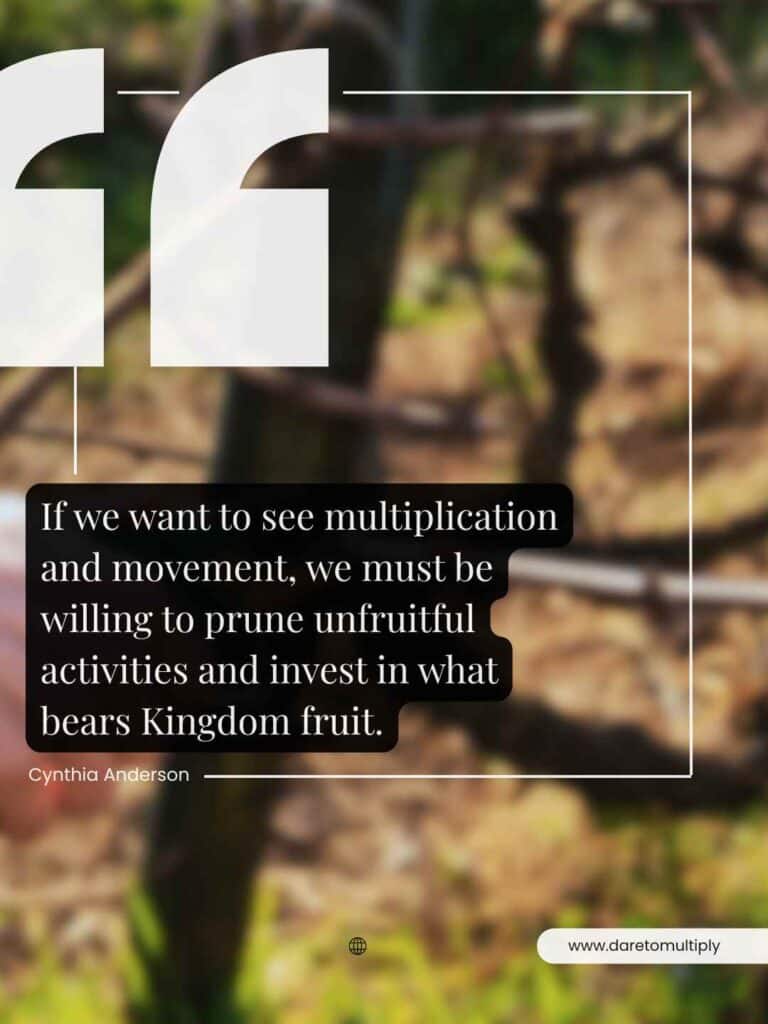Pruning is rarely pleasant. It often makes things look worse before they get better. Outside my home in Thailand, flowering shrubs line the walkway. Every few months, I trim them back—even the branches still blooming. It feels counterintuitive, but it’s essential for their health and future growth.
The same principle applies to disciple-making. If we want to see multiplication and movement, we must be willing to prune unfruitful activities and invest in what bears Kingdom fruit.
Movement Leaders Evaluate and Prune
In recent reflections on the kind of leaders God entrusts with movements, one trait stands out: the willingness to stop doing good things to focus on fruitful ones. Movement leaders evaluate their efforts in light of the vision God has given them—to obey Christ by multiplying disciples. They don’t cling to programs or traditions that no longer serve that purpose.

I once coached a passionate young leader in Asia. He embraced movement principles and longed to see his people know God. Yet, despite his enthusiasm, he struggled to make progress. His loyalty to his father, a pastor, and to the traditional church structure kept him busy with conferences, weddings, and errands. Each time we met, he had been occupied with something else—something good, but not fruitful in terms of disciple making.
Years later, he still leads a small church. He could have started a movement. The potential was real, but he wasn’t willing to make hard choices. He couldn’t prune away the good to make room for the best.
He Cuts Off Unfruitful Branches
Jesus said, “I am the true vine, and my Father is the gardener. He cuts off every branch in me that bears no fruit, while every branch that does bear fruit he prunes so that it will be even more fruitful.” (John 15:2, NIV)
This verse reminds us that pruning is not punishment—it’s preparation. God, the Master Gardener, lovingly removes what hinders growth so that we can flourish in our calling. As disciple makers, we must ask: What needs to be pruned in my life to make space for fruitfulness?
Pruning often involves difficult decisions. It may mean stepping away from programs that consume time but don’t produce multiplying disciples. It could mean saying no to speaking engagements, meetings, or even family obligations that, while good, distract from the mission. These choices aren’t easy, and everyone may not understand them. But they are necessary if we want to see multiplication.
Here are a few things I’ve personally had to prune:
– Training programs that didn’t result in obedient disciples
– Leadership teams that didn’t align with my disciple-making vision
– School speaking engagements unrelated to outreach
– Conferences attended out of obligation
– Draining meetings that lacked purpose
– Attending every family event
Creating Space
Pruning isn’t just about cutting back—it’s about creating space. When we remove what’s unfruitful, we open our lives to new, innovative, and potentially fruitful activities. We gain time for prayer, outreach, mentoring, and learning. We can experiment with new methods and invest more deeply in what’s already bearing fruit.
Some fruitful practices I prioritize include:
– Extended prayer and fasting for the lost
– Coaching conversations with emerging leaders
– Prayer walks in my neighborhood
– Discovery Bible Studies, both online and in person
– Leadership development training
– Ongoing personal spiritual growth
If we want to see Disciple Making Movements take root and multiply, we must be intentional. Evaluate your schedule, your commitments, and your ministry efforts. Ask God what needs to be pruned. Then, courageously make space for what matters most.
Questions to Discuss:
What will you stop doing so you can start seeing more fruit?
When was the last time you felt God was pruning you?
Describe a time when pruning in your life released greater fruit.
Please reply below in the comments or join our Dare to Multiply Community to respond and interact with others on this important issue. Consider joining one of our exclusive paid memberships where we Explore Further on this and other disciple-making topics, or Dive Deeper with in-depth interviews.

